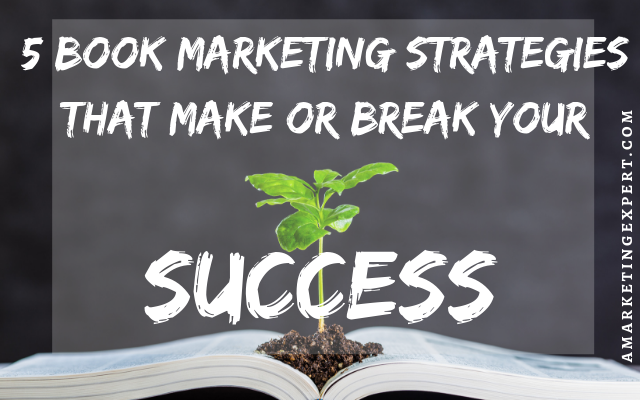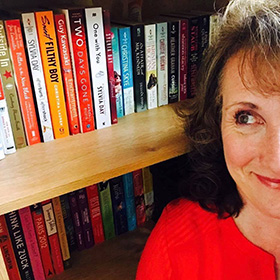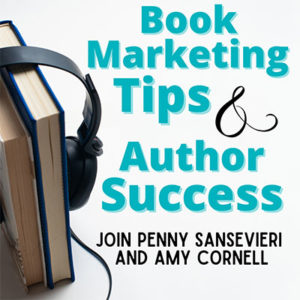Being a successful author is so much more than writing a good book, so I’ve pulled together a short list of book marketing strategies that really determine if you’re set up for success, or if you have a few tweaks to make in your approach.
In fact, my team and I use these book marketing strategies as benchmarks when authors come to us looking for promotion and platform support – that’s how critical they are to determining if a foundation is ready to support an author’s long-term goals.
- Does the book fit in the new release category?
The term “new release” can be somewhat subjective, but I consider a new release to be 6 months old or newer. This is the window where I still feel confident pitching bloggers and media, and the book has the best chance of competing with other hot titles out there.
Yes, I work with books that are older than 6 months all the time, and I have plenty of book marketing strategies up my sleeve that are appropriate for older books, but the reality is the most opportunities are available to books that still fit this window.
I realize once your book is older than 6 months you can’t go back in time, so the takeaway for this is that you really need to plan for your release.
Download my free monthly book marketing planner or check out my piece on how early to start specific book marketing strategies, and plan to chat with a book marketing specialist if you have some money to invest in getting a full team of support.
- Does the cover turn heads?
Your book cover is really what makes or breaks your potential to sell a book. Images are much more impactful than words and the brain processes them infinitely faster – so if your cover doesn’t appeal to your buyer market, you’ll never get a chance to convince them to buy your book with your description, or website, or cool Instagram account.
One of the most lucrative book marketing strategies is hiring a professional cover designer.
If you’re unsure of whether your book is turning heads, then it probably isn’t. Sorry, that’s just the reality. Really good book covers leave no questions about quality, whether the genre or topic is your cup of tea or not.
I usually encourage authors to check out the bestseller list for their category to get an idea of what kinds of covers are appealing to buyers. And no, not every cover on the bestseller list will be mind-blowing, but most of them really are quite solid, and they also give you some insight into what works.
Find a designer who has a healthy portfolio of covers in your genre and get a quote – it can’t hurt to ask around – and it could make all the difference in your sales conversions.
- Does the description get me excited to read more?
A book’s description is so important and there are a lot of fine lines to dance around, which is why I never recommend an author write their own book description on their own. Have a copy editor look it over, have a marketing professional look it over, have a few friends or others in your network look it over if you trust they’ll be honest with you.
You don’t have to incorporate everyone’s feedback but at least it gives you some perspective, and perspective is so important when you’re digging into these really key book marketing strategies that can make or break your success.
The most common pitfalls I see with fiction is they give too much away or they don’t tell you enough – either way they totally miss the mark when it comes to building interest, excitement, and leaving the reader wanting more – so much more that they have to buy the book.
The most common pitfalls I see with non-fiction is that they don’t follow through on the “what’s in it for me?” that potential buyers are looking for. If you write non-fiction, you have hundreds of thousands of competitors. You need to make your unique selling points stand out because the person shopping likely already has a few titles similar to yours, but they haven’t had their needs fulfilled – how are you going to be the book that changes that?
- Does the author have a platform?
We always check to see if an author has a website, social media, are they on Goodreads, do they have a current blog, what’s their history with their topic, do they have a newsletter, do they have any bonus content available?
I know that sounds like a lot of book marketing strategies to check off, but hey, I’m here to help you compete and find real success – so they all matter.
But I also don’t want you to get discouraged, I want you to be inspired! If you aren’t using all these book marketing strategies, that means you have opportunities you haven’t tapped into yet, and that’s fantastic.
Get yourself on track to follow through with some of these crucial platform elements, like brainstorming a list of blog topic ideas or doing some research on what other authors in your genre include in their newsletters – sign up for some and see what inspires you.
My point is, it doesn’t make sense to get discouraged about your success when you aren’t implementing all the book marketing strategies at your disposal. And if you’re unsure of where to start or how to get going, reach out, I can help.
- Does the author have other books?
Nothing sells books like more books. Obviously if you’re a debut author you’re off the hook for this one – but that doesn’t mean you shouldn’t already be planning your next release.
Your virtual bookshelf on Amazon says a lot about your success potential because it tells me (and more importantly, readers) how serious you are about delivering more books to fans.
Think about it, they’re considering buying your book, wouldn’t that be an easier decision to make if you had other titles available with great covers and solid reviews? Of course it would! It means you’re a sure thing and they know they can come back for more.
So, keep your publishing schedule consistent and don’t wait around to “see how things will go” before writing your next book – that’s not a thing, I wish authors would just give that up.
At the end of the day we can’t always hit these 5 key book marketing strategies with every title, but I want you to take this insight and apply it to your next release.
One of the best parts about being an author is the growth we can make. With each release we have a chance to do things differently, to approach our book marketing strategies in a smarter way, and continue to build on all our hard work to date.
Resources and Free Downloads:
Free Monthly Book Marketing Planner
How Early Should You Start Marketing Your Book
6 Reasons to Revise and Re-Release a Book
Please use the social share buttons below if you learned something from this post – your shares really help educate other authors, which raises the bar for publishing and gets more books in readers hands!





0 Comments